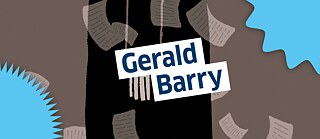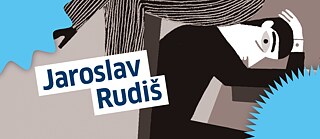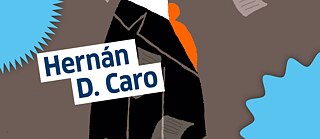Zeitgeister On Air Being Kafka #5 with Gerald Barry

“Without Ohropax day and night, I really couldn’t cope,” wrote Franz Kafka in 1922. The author from Prague struggled with the loudness of the city. The Irish composer Gerald Barry revisited precisely this characteristic in his work “Kafka’s Earplugs” – and in 2023 he celebrated its world premiere by the BBC Philharmonic Orchestra in London. In this podcast episode, Barry speaks to Soraya Sarhaddi Nelson about how Franz Kafka’s auditory sensitivity inspired him. Barry finds it highly appropriate that “Kafka’s Earplugs” has been described as both the most beautiful and the most horrible music in the world. After all, Kafka was said to have been equally contradictory.
Transcript
Soraya Sarhaddi Nelson: Most of us have heard of Franz Kafka’s books and short stories – but his ears? How the sound-sensitive author heard the world through earplugs served as inspiration for today’s guest, who is a famous Irish composer. I’m your host, Soraya Sarhaddi Nelson, and welcome to the second season of ZEITGEISTER ON AIR by Goethe-Institut and Common Ground Berlin. It’s been 100 years since Kafka passed away, and we are honoring his legacy with this audio and written series called Being Kafka. You can learn more at goethe.de/kafka. But back to Kafka’s ears and our composer. His name is Gerald Barry, and I reached him at home in Dublin via Zoom. I asked the 71-year-old about his life, his classical music, and how he ended up writing Kafka’s Earplugs.
Gerald Barry: Well, I was born in Ireland in 1952, and I discovered music when I was about 13 or thereabouts, though I was always aware of it as a child. Then, I took off from there and studied in Cologne with Stockhausen, and Musiktheater [German for musical theatre] with Mauricio Kagel in Cologne, and I’ve been going ever since.
Soraya Sarhaddi Nelson: Gerald, what would you say is your best known work?
Gerald Barry: Well, I’ve written many operas. I suppose one of the most popular or the most often done is The Importance of Being Ernest, an opera on the text by Oscar Wilde, and also my most recent opera, Alice’s Adventures Under Ground based on the Lewis Carrol: Alice in Wonderland. And I have a new opera coming up on Salome on the Oscar Wilde text that will be done in Los Angeles in 2026.
Soraya Sarhaddi Nelson: How did you come to compose [Franz] Kafka’s Earplugs?
Gerald Barry: I was commissioned by the BBC.
Soraya Sarhaddi Nelson: Was this for their Promenade Concerts series?
Gerald Barry: Yes, for the Proms in 2023, and it was premiered by the BBC Philharmonic at the Royal Albert Hall in London and broadcast, and it was a kind of prelude to that. I think I wasn’t involved in the conversations. It was my publisher, Schott, and maybe Schott told them that I had this – was thinking about Kafka. And they knew that the Kafka centenary was coming soon, and they, fairly short notice, asked me if I would do this piece, and that’s how it came about. So maybe they knew already that I was thinking about a Kafka piece, and then they said, would I do it for this Prom – Promenade – concert?
Soraya Sarhaddi Nelson: How did you come up with the idea? I mean, Kafka’s ears and earplugs are not usually what people think about.
Gerald Barry: Well, the idea had been in my head for years, actually, and so the commission from the BBC was a random coincidence. Just coincided with something which had interested me. The music that I had written, it’s as if Kafka is hearing the world through his earplugs, what he called his “fear-sharpened ears.” All his life he was tormented by noise, you know, door slamming, stove door slamming, the apartment door yawning and groaning, his father scraping ashes from the stove, his sister shouting in the hallway, a hiss somewhere, a hopeless buzzing. He wrote somewhere, “I think I should crawl like a serpent into the adjoining room and ask my sisters and their young friend to be quiet.” And Prague communal living plagued him. He called it the “lechery, dissolute, uncontrolled bodies, thoughts, and desires of crowded Prague.” And in the countryside even, he couldn’t escape – the noises of geese, haymaking, a youth playing his horn, and he felt expelled from the world. And at one time he was in somebody’s apartment and he heard a gramophone through the walls of the neighboring apartment, and he thought how wonderful this invention was. But then he thought he perhaps shouldn’t enthuse about it so much – [unintelligible] catch on. His lover, Milena Jesenská, said, “But Franz cannot live. Franz does not have the capacity for living. Franz will never get well. Franz will die soon. He is incapable of getting drunk because he possesses not the slight of refuge. For that reason he is exposed to all those things against which we are protected. He is like a naked man among a multitude who are dressed.” By the way, Kafka also laughed a lot. He was a great comedian. He has a mixture in him of angst and joy.
Soraya Sarhaddi Nelson: Some say Kafka’s sensitivity to noise was a reflection of his brilliance. Is that captured in your composition?
Gerald Barry: A reflection of his brilliance?
Soraya Sarhaddi Nelson: Correct.
Gerald Barry: No, the music that I’ve written is simply as if Kafka…it is how he would have heard music if he was wearing his earplugs. He protected himself from sound and he was hypersensitive to sound and very tormented by it. So the music is really a labyrinth of sound, different masses of sound moving in different ways at the same time. And it’s as if Kafka is what… it’s – the music places you in Kafka’s head and hearing the world as he heard it in a muffled way while wearing his earplugs.
Soraya Sarhaddi Nelson: Did any particular Kafka book or writing inspire Kafka’s Earplugs?
Gerald Barry: No. It’s simply Kafka as a person, his personality and his body in relation to the world. It’s simply him.
Soraya Sarhaddi Nelson: Do you recall when you first came across Kafka and his works?
Gerald Barry: Oh, decades and decades ago. Everybody knows about Kafka. I mean, I read all of Kafka in, I don’t know, 2005 and biographies as well. So the work is very strange, of course, as everybody knows, but also very funny. And Kafka himself used to laugh out loud when reading the work aloud. So he was this strange mixture of extraordinary fear of the world and a great sense of humor. So he laughed and he dreaded and feared and laughed again all particularly at the same time. He was an incredible ‘stew.’
Soraya Sarhaddi Nelson: You say you read his works. Do you have a favorite book by Kafka?
Gerald Barry: I don’t have a favorite book. I like them all.
Soraya Sarhaddi Nelson: How is Kafka’s Earplugs different from your other compositions?
Gerald Barry: It’s unusual for me in that it deals with what you might call ‘clouds of sound.’ ‘Clouds’ as what you see in the sky, moving in different levels. And it’s really like hearing the world through a veil and the veil being the earplugs he wore. He was so obsessed with these earplugs that when World War I broke out in 1914, one of his main concerns was whether the war would affect the posting of his delivery plugs from Berlin.
Soraya Sarhaddi Nelson: Now this may seem like a strange question, but do you recommend listeners wear earplugs when listening to your composition? I mean so they get a better sense of what life was like for him?
Gerald Barry: Wear earplugs listening to my piece?
Soraya Sarhaddi Nelson: Yes.
Gerald Barry: [Laughs] Well, you could if you wanted. It might be interesting. And you might want to put on the earplugs after hearing some of it if you hated it. So that might be useful. But no, I think probably the normal way of listening to music is without earplugs. And so it would be – it’s music like Beethoven or Mozart. You know, you wouldn’t put earplugs in listening to Beethoven. But of course you can do anything you like. You can stand on your head or throw yourself out the window or whatever.
Soraya Sarhaddi Nelson: As you mentioned, Kafka’s Earplugs isn’t the easiest piece to listen to. There was one YouTube entry I saw that described it as “the most beautiful, ugly sound in the world.” What do you want listeners to take away from Kafka’s Earplugs?
Gerald Barry: Oh, I see. That’s interesting. “The most beautiful, ugly sound in the world.” This is what somebody commented on YouTube?
Soraya Sarhaddi Nelson: Yes.
Gerald Barry: I see. Well, that’s an extremely good reaction, actually. I’m very pleased to hear that. Normally, you get incredible, stupid insults on YouTube, but that’s a good one.
Soraya Sarhaddi Nelson: Why do you say that?
Gerald Barry: “Beautiful and ugly.” I mean, it actually describes Kafka, actually, in a way in these two opposites, like I’m saying that Kafka was filled with fear, but also he had –was filled at times with joy. So there you have two opposites – joy and fear. And this person describes my music as beautiful and ugly [laughs]. So that’s very good, actually. I’m very pleased to hear that.
Soraya Sarhaddi Nelson: Well some of the reviews I’ve read reflect some discomfort with your composition. The Guardian, for example, compared anyone who chooses to listen to it as “seeking to embrace the hallucinatory paranoia of the mole-like protagonist of Kafka’s book, Der Bau.” What do the reviewers not understand about the piece? Or was that your intention?
Gerald Barry: What was it again you said? Can you say it again?
Soraya Sarhaddi Nelson: Sure. They compared anyone who chooses to listen to Kafka’s Earplugs as, “seeking to embrace the hallucinatory paranoia of the mole-like protagonist of Kafka’s book, Der Bau.”
Gerald Barry: That sounds like a pretty good thing from The Guardian. I mean, you can use words like, I just would say, surrealism and paranoia or whatever. Kafka was incredibly paranoid as well. And so that’s good too. This is all good. I can only do what I do, so I do it to the best of my ability. And the music comes from my nervous system, from my gut, and from my entrails, from my inside, from my body. And that is how Kafka also related to the world. I mean, he was incredibly physical. His nervous system was on fire a lot of the time. He was hypersensitive, which was – and so am I! – which was part of…caused him his torment. And so all of that stuff, really, somebody whose nerves are too on fire, too awake, too alive, and that can cause you a lot of trouble.
Soraya Sarhaddi Nelson: So do you think reviewers get it?
Gerald Barry: Everything you said is…I haven’t read any reviews, so I don’t know anything about reactions. So the two things you mentioned are good. Those are good reactions.
Soraya Sarhaddi Nelson: Are there any particular musical instruments you associate with Franz Kafka, and did you incorporate them into this piece?
Gerald Barry: No. It’s straightforward, symphony orchestra – strings, woodwind brass, and very quiet timpani. So that’s it, really. And it’s just these blocks of sound, waves of sound, clouds of sound, moving at different levels at the same time. It’s a kind of a ‘whoosh’ and conjuring the strange world of Kafka.
Soraya Sarhaddi Nelson: Just a quick note for our listeners. If you want to hear the composition, you can find it on YouTube by searching for Kafka’s Earplugs. Gerald, are you happy with the composition? Is there anything you would do differently now in hindsight?
Gerald Barry: I haven’t listened to it since. The only time I ever heard it was actually at the performance. I haven’t listened to a recording or anything else. I haven’t listened to it again. So I only heard the rehearsals and the concert. My best experience listening to it actually was on the day of the concert in the afternoon at the dress rehearsal, standing in the middle of the Albert Hall, the empty Albert Hall in London alone, in the middle of the hall looking at the orchestra. So they were playing to an audience of one – me. And that was my best experience. So at the actual concert, you couldn’t stand there. So I was sitting to the side of it. And so the music is – you’re not getting perhaps the full impact of it. But so, I was pleased. Then I felt I had not messed up. And I felt that, I think, it’s an honorable piece and that I was true to Kafka.
Soraya Sarhaddi Nelson: It’s been a hundred years since Franz Kafka died. Do you think he and his works are still relevant today?
Gerald Barry: Of course, they will always be. As long as this planet is around, Kafka will be around. Kafka is like Mozart or Schubert or Shakespeare. All of these people will, they will…they’re like the air. They will never not exist in our heads and in life.
Soraya Sarhaddi Nelson: We associate him with writing and literature. Was he also musical?
Gerald Barry: As far as I remember, I don’t think he had a very strong relationship with music or relation to music. But I think he enjoyed like these Yiddish groups who came to Prague from the East around whenever it was 1910 or ‘20 or that period. So he enjoyed that theater, the music in that theater and the Yiddish songs and everything. I don’t think he was strongly alive to music. At least that’s my memory. I could be wrong.
Soraya Sarhaddi Nelson: Well, you certainly helped bring music and Kafka together. It’s definitely an interesting composition.
Gerald Barry: Yeah, I hope so.
Soraya Sarhaddi Nelson: Thank you, Gerald, and have a great day.
Gerald Barry: Thank you. Okay, bye.
Soraya Sarhaddi Nelson: Okay, bye.
Soraya Sarhaddi Nelson: That was composer Gerald Barry, and I’m Soraya Sarhaddi Nelson, a long-time foreign correspondent specializing in war zones who now host the current affairs podcast Common Ground Berlin. Join us next week, for Being Kafka, when we interview a prominent Czech author about his Kafka band.
Host: ZEITGEISTER ON AIR is brought to you by the Goethe-Institut. Thanks to all of our friends and partners for making this series possible. [Music]


